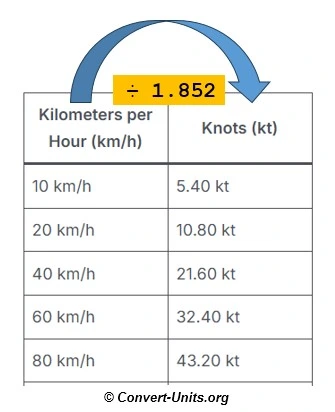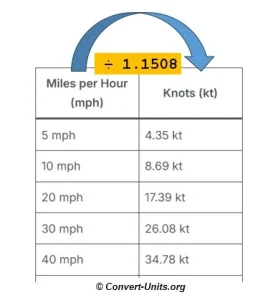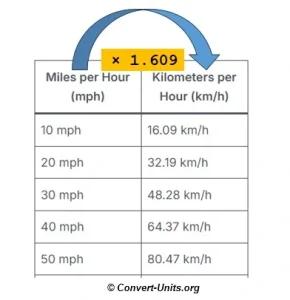
km/h to kt Conversion Calculator
Click on the following link if you want to convert knots to kilometers per hour – kt to km/h
History
The kilometer per hour (km/h) became standard with the rise of the metric system in the 18th century.
Meanwhile, the knot (kt) has much older roots in seafaring traditions and is based on the nautical mile.
Because 1 nautical mile = 1.852 kilometers, the relationship between the two is simple:
1 km/h = 0.5399568 knots
Common Usage
- km/h is used for road speeds, trains, and cars.
- knots (kt) are used for aircraft, ships, and wind speeds.
For instance, if an airplane flies at 900 km/h, that’s about 486 knots.
Conversion Formula
To convert kilometers per hour to knots:
knots = km/h ÷ 1.852
Example:
Convert 100 km/h to knots.
100 ÷ 1.852 = 54.00 kt
So, 100 km/h equals 54 knots.
Conversion Table
| Kilometers per Hour (km/h) | Knots (kt) |
|---|---|
| 10 km/h | 5.40 kt |
| 20 km/h | 10.80 kt |
| 40 km/h | 21.60 kt |
| 60 km/h | 32.40 kt |
| 80 km/h | 43.20 kt |
| 100 km/h | 54.00 kt |
| 120 km/h | 64.80 kt |
| 150 km/h | 81.00 kt |
| 200 km/h | 108.00 kt |
| 900 km/h | 486.00 kt |
Interesting Facts
- Wind speeds in aviation weather reports (METARs) are always given in knots.
- The fastest passenger jet, the Concorde, cruised at about 1,350 km/h (729 knots).
- Many sailboat racing classes still express performance in knots, even in metric countries.
Frequently Asked Questions
1. How many knots are in one km/h?
0.5399568 knots.
2. How do I convert km/h to knots?
Divide by 1.852.
3. What’s faster: 100 km/h or 100 knots?
100 knots – that equals 185 km/h.
4. Why do planes use knots, not km/h?
Because knots relate directly to nautical miles, which match the Earth’s navigation grid.
5. Are knots used worldwide?
Yes, in both aviation and marine navigation, regardless of the country’s main unit system.



